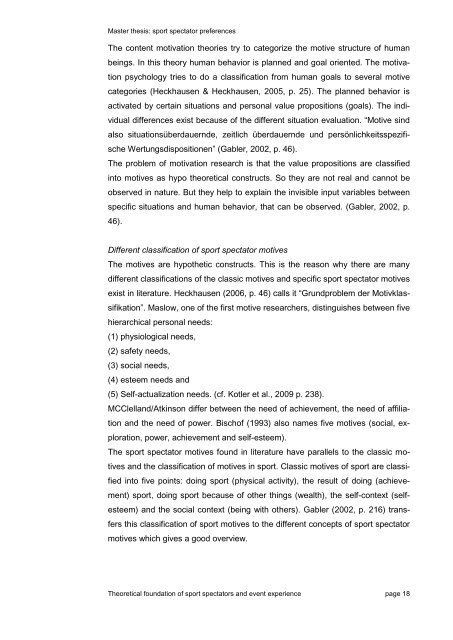MASTER’S THESIS
Vorlage Seminararbeit - schuster-solutions.de
Vorlage Seminararbeit - schuster-solutions.de
- No tags were found...
You also want an ePaper? Increase the reach of your titles
YUMPU automatically turns print PDFs into web optimized ePapers that Google loves.
Master thesis: sport spectator preferences<br />
The content motivation theories try to categorize the motive structure of human<br />
beings. In this theory human behavior is planned and goal oriented. The motivation<br />
psychology tries to do a classification from human goals to several motive<br />
categories (Heckhausen & Heckhausen, 2005, p. 25). The planned behavior is<br />
activated by certain situations and personal value propositions (goals). The individual<br />
differences exist because of the different situation evaluation. “Motive sind<br />
also situationsüberdauernde, zeitlich überdauernde und persönlichkeitsspezifische<br />
Wertungsdispositionen” (Gabler, 2002, p. 46).<br />
The problem of motivation research is that the value propositions are classified<br />
into motives as hypo theoretical constructs. So they are not real and cannot be<br />
observed in nature. But they help to explain the invisible input variables between<br />
specific situations and human behavior, that can be observed. (Gabler, 2002, p.<br />
46).<br />
Different classification of sport spectator motives<br />
The motives are hypothetic constructs. This is the reason why there are many<br />
different classifications of the classic motives and specific sport spectator motives<br />
exist in literature. Heckhausen (2006, p. 46) calls it “Grundproblem der Motivklassifikation”.<br />
Maslow, one of the first motive researchers, distinguishes between five<br />
hierarchical personal needs:<br />
(1) physiological needs,<br />
(2) safety needs,<br />
(3) social needs,<br />
(4) esteem needs and<br />
(5) Self-actualization needs. (cf. Kotler et al., 2009 p. 238).<br />
MCClelland/Atkinson differ between the need of achievement, the need of affiliation<br />
and the need of power. Bischof (1993) also names five motives (social, exploration,<br />
power, achievement and self-esteem).<br />
The sport spectator motives found in literature have parallels to the classic motives<br />
and the classification of motives in sport. Classic motives of sport are classified<br />
into five points: doing sport (physical activity), the result of doing (achievement)<br />
sport, doing sport because of other things (wealth), the self-context (selfesteem)<br />
and the social context (being with others). Gabler (2002, p. 216) transfers<br />
this classification of sport motives to the different concepts of sport spectator<br />
motives which gives a good overview.<br />
Theoretical foundation of sport spectators and event experience page 18




